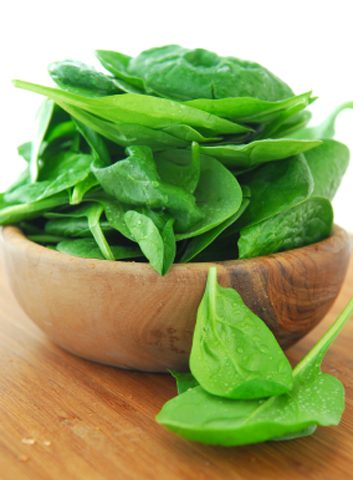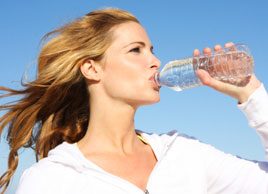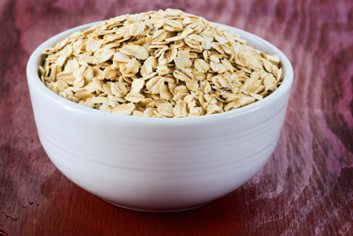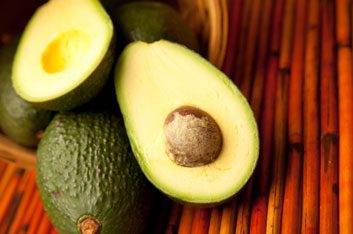
Up your intake of fruit and veggies
A small Spanish study found that men who ate more fruits and vegetables and fewer meat and dairy products improved their sperm quality. Other studies also suggest that antioxidant-rich produce may benefit sperm, therefore increasing fertility.

Eat a healthy diet and lose extra pounds
A Harvard school of public health study determined that women whose lifestyle includes a diet with fewer trans fats and more monounsaturated fats, vegetable proteins, multivitamins and iron were most likely to conceive. Their findings also corroborated that being overweight or obese can significantly hamper conception.

Consider acupuncture
Acupuncture raised the likelihood of conception by 65 percent in women undergoing embryo transfer via in vitro fertilization, according to a University of Maryland review of seven clinical trials involving 1,366 women. While this research is preliminary, it’s something to consider as a complement to other healthy fertility choices. Look for a qualified, well-trained acupuncturist who sterilizes his or her needles (to avoid diseases such as hepatitis C and HIV).

Protect him from air pollution
Car exhaust hurts sperm. A recent study ledy by Health Canada found that mice who were exposed to pollutants had 60 percent more sperm mutations after 10 weeks than mice who were breathing in HEPA-filtered air. Human studies also suggest that exhaust affects sperm quality and motility (its ability to move). So encourage him to drive with the windows closed, walk on side streets instead of main roads and stop idling the car engine.

Suggest he find a new spot for his laptop
Researchers at the State University of New York at Stony Brook measured the temperature of the scrotums of 29 men with laptops resting on their laps, and found it spiked 2.7?C on average. It’s already been proven that too much warmth down there decreases male fertility. Luckily, there’s a simple solution to improve it: Use a desk.

Make love daily
Don’t avoid sex to build up his sperm count. A pilot study in Australia found that regular ejaculation through sex or masturbation reduces sperm’s DNA damage and improves sperm’s shape and motility. “For couples trying to conceive, daily sex near ovulation is better,” says the study’s author Dr. David Greening, a reproductive medicine specialist with Sydney IVF. What does this mean for couples trying to conceive? Just do it.

Get enough folic acid
Folic acid and iron both affect fertility. Folic acid is a vital part of building DNA and converting some amino acids into others. So eating foods high in folic acid, such as spinach, beans, oranges, strawberries and lentils, may influence the start of a pregnancy and its continuation, as well as help prevent neural tube defects, according to The Fertility Diet. With regard to iron, the egg needs iron to provide the energy to power the DNA and protein synthesis required for fertilization. Again, plant foods high in iron, including spinach, legumes, and nuts and seeds, are beneficial for those who eat a more plant-based diet.

Avoid alcohol
Water keeps you hydrated, which is important for general good health and fertility. But pull back on the booze. A study in Stockholm of more than 7,000 women between 18 and 28 examined alcohol consumption and infertility, and it was the high-alcohol consumers that went for infertility exams at hospitals. A study conducted at M.G.R. Medical University India discovered that chronic alcohol consumption decreased semen volume, sperm count, motility and the number of normal sperm.

Eat a diet rich in whole grains
Reach for whole grain foods like oatmeal, rice and barley, because they are “slow carbs” that have a gradual effect on insulin, as opposed to highly refined carbs (cakes, pizza, pastries, chips, white rice, etc.), which cause insulin to spike. When insulin rises too high, it disrupts the finely tuned balance of hormones needed for reproduction. Women who have polycystic ovary syndrome (PCOS), the single most common cause of ovulatory infertility, benefit especially from slow carbs because they usually have insulin resistance.

Eat healthy fats
Not all fats are bad, as was once thought. Monounsaturated fats, found in olive oil, cashews, almonds, pumpkin and sesame seeds, improve the body’s sensitivity to insulin and ease inflammation, providing a boost to fertility. On the other hand, trans fats are bad for fertility. They increase inflammation throughout the body and quash the activation of PPAR-gamma (receptors that switch on insulin sensitivity), which means higher blood sugar and insulin levels. Both factors interfere with ovulation, conception and early embryonic development, says Skerrett.
Related:
• 10 reasons why sex is good medicine
• How to get pregnant
• 5 health conditions helped by acupuncture
